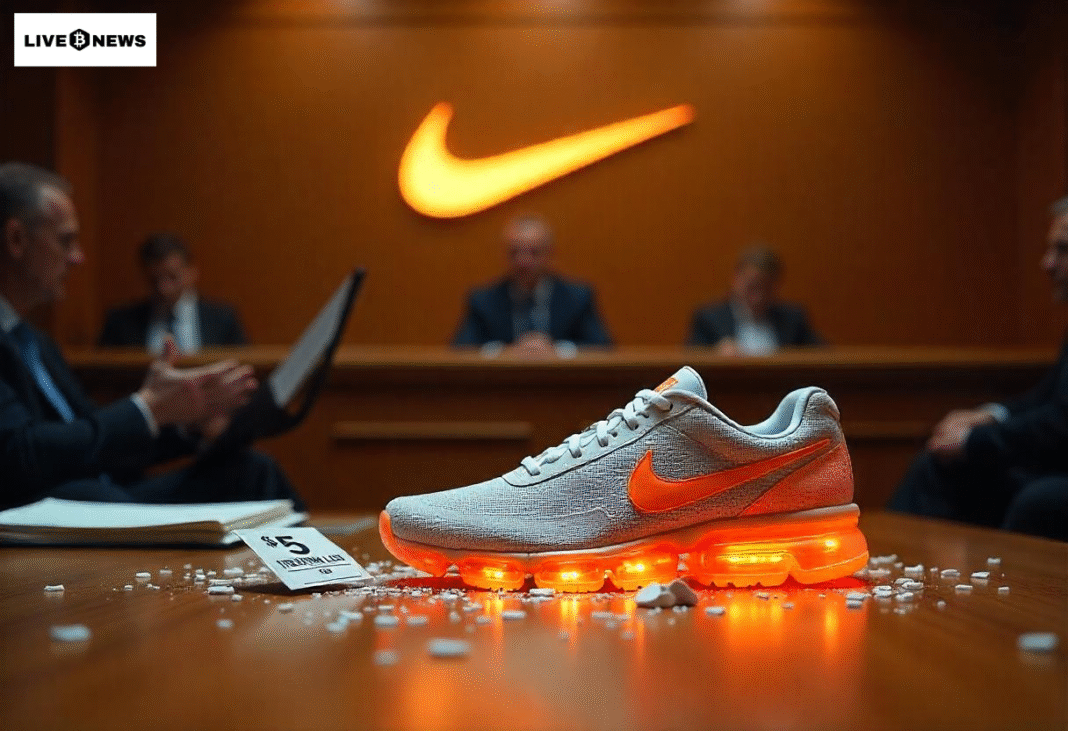- Nike faces a $5M+ lawsuit after shutting down its RTFKT NFT unit.
- Nike pledges to preserve RTFKT’s innovation despite facing legal challenges.
Nike is facing a class action lawsuit after shutting down its RTFKT unit. According to Reuters, the lawsuit was filed in Brooklyn, New York, by a group of NFT buyers. RTFKT sustained financial losses because Nike terminated its operations in December 2024. Jagdeep Cheema from Australia brings forth a lawsuit against Nike while his co-parties ask for damages which exceed $5 million.
Buyers Accuse Nike of Misleading NFT Sales
RTFKT became the property of Nike through their acquisition in December 2021. Nike stated that RTFKT employed emerging tech to build innovative collectible digital assets when they acquired it last December. RTFKT offered Nike-themed non-fungible tokens alongside various digital collectible assets to their customers. Numerous people anticipated that these NFTs would increase in market value.
However, things changed quickly. In December 2024, Nike advised its audience that the RTFKT operations were coming to an end. Once RTFKT ceased operations, the market interest for the NFTs plummeted instantly. Buyers experienced dramatic market value drops when their NFTs lost all their worth during one night. All those buyers incurred serious monetary losses from the events.
The purchasers allege that Nike gave them incorrect information about its products. Nike sold NFTs to its clients, who argue that the company did not properly file for proper securities registration. The buyers state their NFT purchase would not have happened because they were unaware of the instability risks. Nike allegedly deceived its buyers by ending the operation unexpectedly to their detriment.
Current U.S. laws fail to clarify NFTs’ status because of regulatory uncertainties. Regulatory bodies together with courts continue to analyze whether NFTs fulfill the requirements for classification as securities under U.S. law. Lawuits related to NFTs have multiplied because courts and regulators are unsure about the legal status of these digital assets. This dispute continues to expand an already increasing number of judicial proceedings involving digital properties.
Meanwhile, Nike has yet to publish any official statements about the lawsuit that the plaintiffs have filed against them. Lawyer Phillip Kim refused to make any comments related to the case. The court proceedings will determine the future defense strategy of Nike.
Nike Vows to Preserve RTFKT Innovation After Shutdown
The lawsuit accuses WREX of violating consumer protection legislation that functions in four specific states, including New York along with California, Florida, and Oregon. The plaintiffs ask for damages exceeding $5 million, though they do not set a particular figure. The plaintiffs expect financial reimbursement for their money lost.
Furthermore, the company statement highlighted that Nike planned to keep the innovative principles of RTFKT alive despite its closure. Nike acknowledged RTFKT as a source of innovation that had stimulated numerous creators along with their projects. Enterprises ignored this information when they felt disregarded by Nike.
The Rosen Law Firm initiated investigative procedures for buyers through its March 2025 statement. The law firm establishes its practice around the protection of investor rights in the United States. A class action lawsuit is being prepared by the Rosen Law Firm to return lost funds to NFT buyers. The legal fees stated that buyers need to pay them only when the lawsuit achieves a successful outcome.
Additionally, the current lawsuit demonstrates the dangers inherent to digital asset markets which are currently expanding. New technologies offer Nike chances for growth but investors generally remain in a state of doubt about these emerging trends. The emergency shutdown of a key digital division created an atmosphere of unfairness for numerous prospective purchasers.
The business decisions made by Nike at RTFKT resulted in major legal problems. This proceeding may determine future approaches that companies take toward NFTs and digital assets. The situation could provide American courts with a better understanding concerning NFT legal status.



